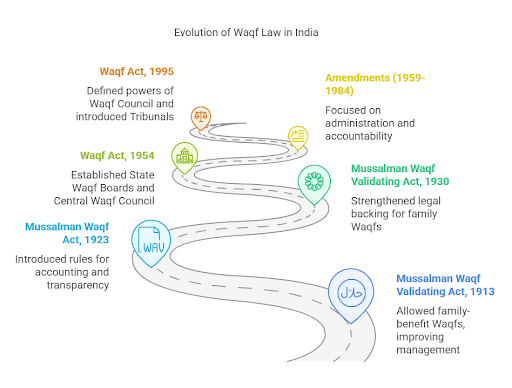



The Supreme Court partially stayed key provisions of the Waqf (Amendment) Act, 2025, halting executive overreach and the five-year Islamic practice requirement. The ruling highlights judicial vigilance in upholding constitutional principles, separation of powers, and ensuring legislative reforms comply with the rule of law.

Copyright infringement not intended
Picture Courtesy: NEWSONAIR
|
Read all about: WAQF ACT AMENDMENTS l SC HEARS WAQF ACT 2025 CHALLENGE l UMEED PORTAL FOR WAQF LAUNCHES |
The Supreme Court upheld the constitutionality of the Waqf (Amendment) Act, 2025, but stayed some provisions.
No Stay on Entire Act
The Court noted that stays on entire statutes are granted only in exceptionally rare circumstances due to the presumption of constitutionality. This interim decision does not affect the final outcome of challenges to the Act.
Stayed Provisions
Section 3 (Five-Year Practice Clause): Stayed until states frame rules/mechanisms to verify if a person has practiced Islam for five years, to prevent arbitrary enforcement
Section 3C Proviso (Executive Adjudication): Stayed the provision that allows district collectors or designated officers to decide if waqf properties encroach on government land, citing violation of separation of powers.
Non-Muslim Representation
Allowed nomination of non-Muslims to Waqf Boards but capped at no more than 4 in the Central Waqf Council (out of 20) and 3 in State Waqf Boards.
Directed states to prefer Muslim Chief Executive Officers for boards, as far as possible.
Other Observations
No interference with mandatory waqf registration (required since 1995) or "waqf by user" abolition at this stage. The Court noted that unregistered waqfs can still seek registration.
Waqf refers to a permanent endowment of movable or immovable property by a Muslim for religious, or charitable purposes, under Islamic law.
Key Principles
India has 8.72 lakh waqf properties spanning over 38 lakh acres, making it the third-largest landowner after the Railways and Armed Forces.
1954 Waqf Act: First central law for waqf administration; created Survey Commissioners.
1995 Waqf Act: Established Central Waqf Council and State Waqf Boards; mandated registration; introduced Waqf Tribunals for disputes. Section 40 empowered boards to inquire into waqf status.
2013 Amendments: Enhanced transparency; mandatory contributions from waqf institutions (7%); digitized records.
2025 Amendments: Comprehensive reforms for efficiency, inclusivity, and dispute resolution; passed in April 2025.

Separation of Trusts: Muslim trusts under other laws excluded from waqf classification.
Eligibility: Only practicing Muslims (5+ years) can dedicate property; protects women's inheritance rights.
Dispute Resolution: Removes Section 40 (board's inquiry power); empowers senior officers for government land claims; applies Limitation Act, 1963, to claims.
Waqf Tribunals: Three-member bodies (judge, officer, Muslim law expert); appeals to High Courts within 90 days.
Inclusivity: Non-Muslims and women on boards; representation from sects (Shia, Sunni, etc.) and OBC Muslims.
Transparency: Reduced contributions to boards (5% from 7%); central portal for registration.
Technology Integration: Mandatory online property details by mutawallis (appointed manager or caretaker of a waqf).
Government Overreach: Shifts power from boards to executives (e.g., collectors deciding waqf status), violating Article 300A (property rights).
Religious Autonomy: Inclusion of non-Muslims dilutes minority rights under Article 26; no parallel for other faiths (e.g., Hindus/Sikhs).
Ambiguity in Practice: Undefined "practicing Muslim" risks arbitrary denials; removal of "waqf by user" threatens ancient undocumented sites.
Discrimination Claims: Petitioners argued it undermines Article 25 (freedom of religion).
Implementation Gaps: Rules pending; potential for prolonged disputes without clear mechanisms.
Clear Rules: Centre and states must clearly frame guidelines for verifying religious practice and dispute resolution to operationalize stayed provisions.
Stakeholder Dialogue: Engage Muslim organizations, opposition, and civil society for balanced implementation, addressing autonomy concerns.
Judicial Oversight: Expedite final hearings; ensure tribunals are independent and appeals swift under the Limitation Act.
Digitization Push: Fully implement the central portal for transparent management, reducing encroachments.
Comparative Reforms: Draw from successful endowment laws (e.g., Hindu Religious Endowments) for equitable regulation across communities.
The Supreme Court stayed select provisions of the Waqf (Amendment) Act, 2025, while upholding its overall validity pending further hearings.
Source: NEWSONAIR
|
PRACTICE QUESTION Q. The term "Mutawalli", frequently seen in the news in the context of Waqf, what does it mean: A) Religious authority who declares a Waqf. B) Person who originally dedicates the property. C) Administrator appointed to oversee the Waqf property. D) Main beneficiary of the Waqf. Answer: C A Mutawalli is responsible for managing the dedicated property according to the terms set by the Waqf's founder and Islamic law. |
It is a legislative amendment aimed at reforming the management and regulation of Waqf properties in India.
It is a permanent dedication of movable or immovable property for a purpose recognized by Muslim law as pious, religious, or charitable.
A statutory body established to manage and administer Waqf properties.





© 2026 iasgyan. All right reserved